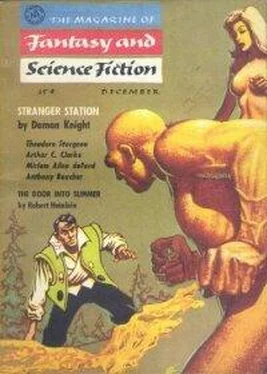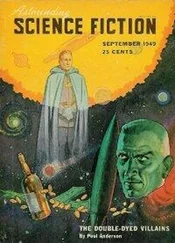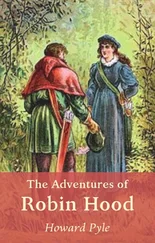Arthur Clarke - Robin Hood, F.R.S.
Здесь есть возможность читать онлайн «Arthur Clarke - Robin Hood, F.R.S.» весь текст электронной книги совершенно бесплатно (целиком полную версию без сокращений). В некоторых случаях можно слушать аудио, скачать через торрент в формате fb2 и присутствует краткое содержание. Год выпуска: 1956, Издательство: Fantasy House, Inc., Жанр: Фантастика и фэнтези, на английском языке. Описание произведения, (предисловие) а так же отзывы посетителей доступны на портале библиотеки ЛибКат.
- Название:Robin Hood, F.R.S.
- Автор:
- Издательство:Fantasy House, Inc.
- Жанр:
- Год:1956
- ISBN:нет данных
- Рейтинг книги:4 / 5. Голосов: 1
-
Избранное:Добавить в избранное
- Отзывы:
-
Ваша оценка:
- 80
- 1
- 2
- 3
- 4
- 5
Robin Hood, F.R.S.: краткое содержание, описание и аннотация
Предлагаем к чтению аннотацию, описание, краткое содержание или предисловие (зависит от того, что написал сам автор книги «Robin Hood, F.R.S.»). Если вы не нашли необходимую информацию о книге — напишите в комментариях, мы постараемся отыскать её.
Robin Hood, F.R.S. — читать онлайн бесплатно полную книгу (весь текст) целиком
Ниже представлен текст книги, разбитый по страницам. Система сохранения места последней прочитанной страницы, позволяет с удобством читать онлайн бесплатно книгу «Robin Hood, F.R.S.», без необходимости каждый раз заново искать на чём Вы остановились. Поставьте закладку, и сможете в любой момент перейти на страницу, на которой закончили чтение.
Интервал:
Закладка:
Robin Hood, F.R.S.
by Arthur C. Clarke
We landed early in the dawn of the long lunar day, and the slanting shadows lay all around us, extending for miles across the plain. They would slowly shorten as the sun rose higher in the sky, until at noon they would almost vanish—but noon was still five days away, as we measured time on Earth, and nightfall was seven days later still. We had almost two weeks of daylight ahead of us before the sun set and the bluely gleaming Earth became the mistress of the sky.
There was little time for exploration during those first hectic days. We had to unload the ships, grow accustomed to the alien conditions surrounding us, leam to handle our electrically powered tractors and scooters, and erect the igloos that would serve as homes, offices, and labs until the time came to leave. At a pinch, we could live in the spaceships, but it would be excessively uncomfortable and cramped. The igloos were not exactly commodious, but they were luxury after five days in space. Made of tough, flexible plastic, they were blown up like balloons, and their interiors were then partitioned into separate rooms. Air locks allowed access to the outer world, and a good deal of plumbing linked to the ships’ air-purification plants kept the atmosphere breathable. Needless to say, the American igloo was the biggest one, and had come complete with everything, including the kitchen sink—not to mention a washing machine, which we and the Russians were always borrowing.
It was late in the “afternoon’—about ten days after we had landed—before we were properly organized and could think about serious scientific work. The first parties made nervous little forays out into the wilderness around the base, familiarizing themselves with the territory. Of course, we already possessed minutely detailed maps and photographs of the region in which we had landed, but it was surprising how misleading they could sometimes be. What had been marked as a small hill on a chart often looked like a mountain to a man toiling along in a space suit, and apparently smooth plains were often covered knee-deep with dust, which made progress extremely slow and tedious.
These were minor difficulties, however, and the low gravity—which gave all objects only a sixth of then-terrestrial weight—compensated for much. As the scientists began to accumulate their results and specimens, the radio and TV circuits with Earth became busier and busier, until they were in continuous operation. We were taking no chances; even if we didn’t get home, the knowledge we were gathering would do so.
The first of the automatic supply rockets landed two days before sunset, precisely according to plan. We saw its braking jets flame briefly against the stars, then blast again a few seconds before touchdown. The actual landing was hidden from us, since for safety reasons the dropping ground was three miles from the base. And on the moon, three miles is well over the curve of the horizon.
When we got to the robot, it was standing slightly askew on its tripod shock absorbers, but in perfect condition. So was everything aboard it, from instalments to food. We carried the stores back to base in triumph, and had a celebration that was really rather overdue. The men had been working too hard, and could do with some relaxation.
It was quite a party; the highlight, I think, was Commander Krasnin trying to do a Cossack dance in a space suit. Then we turned our minds to competitive sports, but found that, for obvious reasons, outdoor activities were somewhat restricted. Games like croquet or bowls would have been practical had we had the equipment; but cricket and football were definitely out. In that gravity, even a football would go half a mile if it were given a good kick—and a cricket ball would never be seen again.
Professor Trevor Williams was the first person to think of a practical lunar sport. He was our astronomer, and also one of the youngest men ever to be made a Fellow of the Royal Society, being only thirty when this ultimate accolade was conferred upon him. His work on methods of interplanetary navigation had made him world famous; less well known however, was his skill as a toxopholite. For two years in succession he had been archery champion for Wales. I was not surprised, therefore, when I discovered him shooting at a target propped up on a pile of lunar slag.
The bow was a curious one, strung with steel control wire and shaped from a laminated plastic bar. I wondered where Trevor had got hold of it, then remembered that the robot freight rocket had now been cannibalized and bits of it were appearing in all sorts of unexpected places. The arrows, however, were the really interesting feature. To give them stability on the airless moon, where, of course, feathers would be useless, Trevor had managed to rifle them. There was a little gadget on the bow that set them spinning, like bullets, when they were fired, so that they kept on course when they left the bow.
Even with this rather makeshift equipment, it was possible to shoot a mile if one wished to. However, Trevor didn’t want to waste arrows, which were not easy to make; he was more interested in seeing the sort of accuracy he could get. It was uncanny to watch the almost flat trajectory of the arrows: they seemed to be travelling parallel with the ground. If he wasn’t careful, someone warned Trevor, his arrows might become lunar satellites and would hit him in the back when they completed their orbit.
The second supply rocket arrived the next day, but this time things didn’t go according to plan. It made a perfect touchdown, but unfortunately the radar-controlled automatic pilot made one of those mistakes that such simple-minded machines delight in doing. It spotted the only really unclimbable hill in the neighbourhood, locked its beam on to the summit of it, and settled down there like an eagle descending upon its mountain eyrie.
Our badly needed supplies were five hundred feet above our heads, and in a few hours night would be falling. What was to be done?
About fifteen people made the same suggestion at once, and for the next few minutes there was a great scurrying about as we rounded up all the nylon line on the base. Soon there was more than a thousand yards of it coiled in neat loops at Trevor’s feet while we all waited expectantly. He tied one end to his arrow, drew the bow, and aimed it experimentally straight towards the stars. The arrow rose a little more than half the height of the cliff; then the weight of the line pulled it back.
“Sorry,” said Trevor. “I just can’t make it. And don’t forget—we’d have to send up some kind of grapnel as well, if we want the end to stay up there.”
There was much gloom for the next few minutes, as we watched the coils of line fall slowly back from the sky. The situation was really somewhat absurd. In our ships we had enough energy to carry us a quarter of a million miles from the moon—yet we were baffled by a puny little cliff. If we had time, we could probably find a way up to the top from the other side of the hill, but that would mean travelling several miles. It would be dangerous, and might well be impossible, during the few hours of daylight that were left.
Scientists were never baffled for long, and too many ingenious (sometimes over-ingenious) minds were working on the problem for it to remain unresolved. But this time it was a little more difficult, and only three people got the answer simultaneously. Trevor thought it over, then said non-committally, “Well, it’s worth trying.”
The preparations took a little while, and we were all watching anxiously as the rays of the sinking sun crept higher and higher up the sheer cliff looming above us. Even if Trevor could get a line and grapnel up there, I thought to myself, it would not be easy making the ascent while encumbered with a space suit. I have no head for heights, and was glad that several mountaineering enthusiasts had already volunteered for the job.
Читать дальшеИнтервал:
Закладка:
Похожие книги на «Robin Hood, F.R.S.»
Представляем Вашему вниманию похожие книги на «Robin Hood, F.R.S.» списком для выбора. Мы отобрали схожую по названию и смыслу литературу в надежде предоставить читателям больше вариантов отыскать новые, интересные, ещё непрочитанные произведения.
Обсуждение, отзывы о книге «Robin Hood, F.R.S.» и просто собственные мнения читателей. Оставьте ваши комментарии, напишите, что Вы думаете о произведении, его смысле или главных героях. Укажите что конкретно понравилось, а что нет, и почему Вы так считаете.












